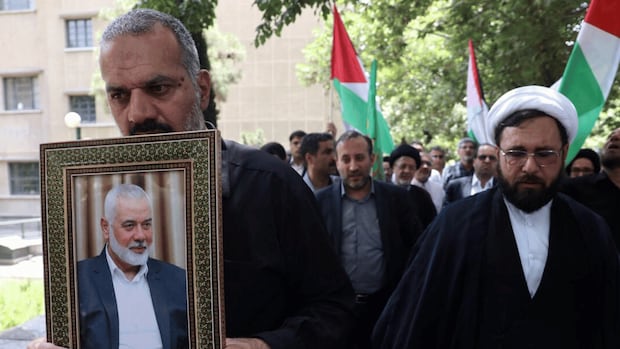The United States says that if Israel were attacked, it would step in to defend it, raising concern the killings of senior Hamas leader Ismail Haniyeh and senior Hezbollah military commander Fuad Shukr in the last 24 hours will trigger an all-out war in the Middle East.
“You saw us do that in April, you can expect to see us do that again,” U.S. Secretary of Defence Lloyd Austin told reporters Wednesday in Subic Bay, Philippines.
In April, the U.S. assisted Israel by helping to intercept Iranian missiles that rained down on the country in response to an Israeli attack on the Iranian embassy in Damascus, Syria.
“But we don’t want to see [an escalation] happen,” said Austin. “We’re going to work hard to make sure that we’re doing things to help take the temperature down and address issues through diplomatic means.”
Austin wouldn’t confirm Israel was responsible for the attack that killed Haniyeh in Tehran, Iran, on Wednesday.
Israel had pledged to kill him and other Hamas leaders after the Oct. 7 attack on southern Israel that resulted in the killing of some 1,200 people and the abduction of 250 others, but did not officially take responsibility for Haniyeh’s assassination.
Haniyeh was Hamas’s top negotiator involved in ceasefire talks between Israel and the Palestinian militant group.
On Facebook, the Israeli government’s press office posted an image of Haniyeh with the word “eliminated” pasted on his forehead.
Hamas leader Ismail Haniyeh was killed in Tehran on Wednesday, Iran’s paramilitary Revolutionary Guard said. Hamas blamed Israel for the attack and Iran’s supreme leader vowed revenge against Israel.
“I’m afraid Israel is now left only with the hardline leaders … which probably makes [a] ceasefire deal much less likely,” said Ali Vaez, director of the Iran Project at the International Crisis Group and adjunct professor at Georgetown University’s School of Foreign Service.
If Israeli Prime Minister Benjamin Netanyahu wanted a ceasefire, Vaez said he would not have assassinated one of the key interlocutors in negotiations.
“It seems that it aligns with the political objectives of Prime Minister Netanyahu, who wants to remain in power and knows that once this war comes to an end, so will his political life,” said Vaez.
Haniyeh was seen as more moderate than Yahya Sinewar, Hamas’s military…
Click Here to Read the Full Original Article at CBC | Top Stories News…

